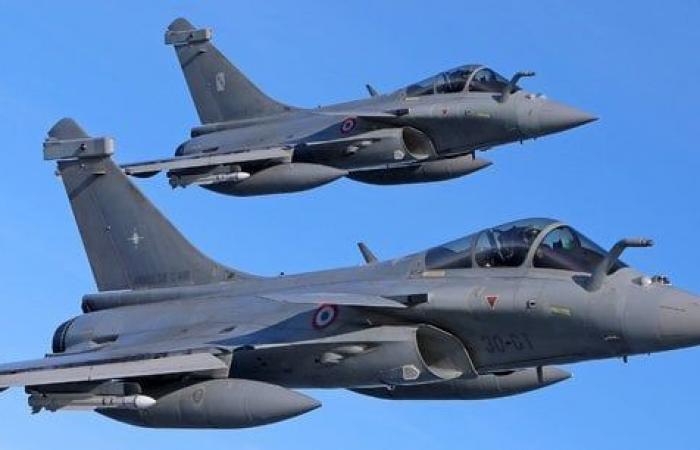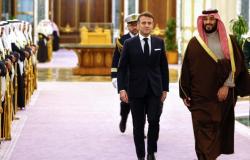Failing to secure major arms contracts with Saudi Arabia (Rafale, mission aircraft, observation satellites, submarines, etc.), Emmanuel Macron must sign during his visit to State (from December 2 to 4) – the first since that of Jacques Chirac in 2006 – a strategic partnership with Crown Prince Mohamed Ben Salmane. This strategic partnership “will enable us to establish a new ambition, a renewed base between France and Saudi Arabia for the next ten years with an associated work plan”explained the Élysée. This is for the presidency of the Republic “to establish and act on an enhancement of the relationship to the level of a strategic partnership”. Because the relationship between Paris and Riyadh remains erratic, particularly in several defense-related issues.
“The strategic partnership allows us to establish a much more in-depth framework for discussion than the one we had until now between France and Saudi Arabia, that is to say it sets up a whole series of sectoral partnerships , discussion committees, and it notably provides for an enhanced political dialogue which will make it possible to regularly involve our Ministers of Foreign Affairs and our Ministers of Defense in a discussion on strategic affairs which concern our two countries,” explained the 'Elysium.
Emmanuel Macron's state visit to Saudi Arabia (from December 2 to 4) has raised many hopes among defense industrialists, who are eyeing orders for some very important ones (Dassault Aviation, Airbus, Naval Group, etc.). ). But, a priori, this trip will not be an opportunity to sign these major contracts, some of which are still in the preliminary phases (submarines). For the Élysée, it is therefore not a surprise: Riyadh had warned the sherpas that the president had sent to Riyadh that no contract in the field of defense would be signed. And this despite the wishes of the Élysée and the bluffing of certain Sherpas to force the hand of Mohamed Ben Salmane (MBS).
The five reasons for this flop
1/ The timing of this trip comes, according to several observers, at the worst time for France. It is stuck between the American presidential election at the beginning of November and the arrival of the new Trump administration in January 2025. For Riyadh, it is therefore urgent to wait for Donald Trump to be installed in the Oval Office to decide on certain major arms files, notably those on combat aircraft. If the Rafale has (or had?) its chance (54 aircraft), it is only because of the very long German veto on a new export to Saudi Arabia of the Typhoon combat aircraft (72 aircraft already sold), manufactured by the Eurofighter consortium (BAE Systems, Airbus and the Italian Leonardo), to the great fury of London. Berlin, which has since lifted its veto, did not wish to provide Riyadh with new weapons which could have been used in the conflict in Yemen.
For the Saudis, who no longer want to depend on the goodwill of the German government's coalition policy, the Rafale is an alternative to the Typhoon, although it is strongly supported by London. But what will happen if Donald Trump offers the crown prince an F-35 even with degraded performance? The United States notes that Saudi Arabia, as it does for its economy, is diversifying its international alliances by moving closer to Beijing and Tehran in particular. The Saudi crown prince even described Iran last month as “Sister Republic” and asked Israel to “respect its sovereignty”. Will Donald Trump encourage MBS, downgraded and abandoned by Joe Biden, to remain fully in Washington's orbit?
2/ If the Élysée suggested that one of the objectives of this visit was to establish a relationship more imbued with trust between Emmanuel Macron and Mohamed Ben Salmane, who left furious during one of his previous visits to Paris. The president, who has canceled this state visit twice in recent years, is going from afar. The French president hopes to establish ties with him “a strong personal relationship”, we tell La Tribune. In addition to a first one-on-one political interview on Monday evening before a working dinner, Emmanuel Macron and Mohamed Ben Salmane will have a one-on-one dinner on the second evening. He them “will allow us to have this privileged interaction which is one of the objectives of the visit”, said the Élysée.
3/ Beyond the timetable which is far from ideal for France's industrial interests, Saudi governance in the field of armaments (SAMI, which has lost its executive president since April, and GAMI) is going through a crisis which is paralyzing currently the kingdom's decision-making on major issues concerning the sector. Files which also concern Saudi Arabia's international partners such as Spain, Italy, even Pakistan and Turkey. Recently, General Authority for Military Industries (GAMI) Governor Ahmad Abdulaziz Al-Ohali announced that the rate of “Saudization” of military spending reached 19.35%, compared to 4% in 2018. Far, far from the objective of achieving more than 50% of localization in Saudi Arabia of public spending on military equipment and services by 2030.
4/ In addition, ODAS, an intermediary company which represents the interests of the French in the Kingdom, is in conflict with the Saudi shipyard Zamil within the framework of a contract obtained via ODAS by the French shipyard CMN (19 interceptor ships, including new manufactured by Zamil). Deemed undesirable by Mohamed Ben Salmane since 2015, ODAS refuses to deliver the ships as long as Saudi Arabia does not pay for the first three ships handed over to the Saudi navy. Which is causing disarray in the bilateral relationship.
5/ Finally, Saudi Arabia must tighten its belt a little due to a falling barrel price (72 dollars for a barrel of Brent). Far from the objectives of Riyadh which is aiming for a barrel of 100 dollars to finance its megaprojects (including NEOM) to diversify its income in the medium and long term. In 2022, Saudi Arabia, whose economy is very focused on oil, saw its oil revenues contract by 9% in 2023. At the same time, growth in the non-oil sector increased by 3 .8% last year. In 2025, the construction of the Saudi budget provides for a reduction in spending (342 billion dollars planned in 2025 compared to 358 billion in 2024). If defense spending will increase by 5% to 272 billion Saudi riyals (69 billion euros), observers have had difficulty really understanding MBS's ambitions in this area.






